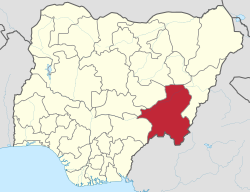INTRODUCTION
Taraba is one of the six states that make up the North-East geopolitical zone of Nigeria. It shares interstate borders with Bauchi and Gombe States to the North, Adamawa State to the East, and Benue, Nasarawa, and Plateau States to the West. Its southern boundary is shared with Cameroon. Jalingo is the state capital.
LANDMASS, LOCATION AND POPULATION
Taraba covers an area of 54,472 square kilometres and lies at latitude 8° 00’ North and longitude 10° 30’ East. It has a population of 2,294,800 (2006 census) 3,066,834 (2016 forecast) and a population density of 42. The state accounts for 1.6% of Nigeria’s population.
HISTORY AND PEOPLE
The original inhabitants of Taraba State were the Jukuns. When the British integrated the state into the protectorate of northern Nigeria it became multi-ethnic comprising the Tiv, Hausa/Fulani and the Jukuns. Taraba State was created in 1991 from the southwestern half of former Gongola State. It was formed during the military government of General Ibrahim Babangida and named after the river which flows through the western part of the state.
Taraba State is home to about eighty ethnic groups and seventy-three languages, making it one of the most diverse states in Nigeria. Among its major ethnic groups are the Jukun, Mambila, Fulani, Jango, Kuteb and Mumuye. The state’s heterogeneous nature is reflected in the religious practices of its people: Islam, Christianity and traditional religion all feature there.
MAIN TOWNS AND CITIES
Jalingo (capital), Muri, Ibi, Takun, Wukari, Zing, Sardauna, Bali, Yono, Kurmi and Gashaka
LOCAL GOVERNMENT AREAS
ADMINISTRATORS AND GOVERNORS
Adeyemi Afolahan (Governor – Military): August 1991 – January 1992
Jolly Nyame (Governor – Civilian (Social Democratic Party)): January 1992 –November 1993
Yohanna Dickson (Administrator – Military): December 1993 – August 1996
Amen Oyakhire (Administrator – Military): August 1996 – August 1998
Aina Owoniyi (Administrator – Military): August 1998 – May 1999
Jolly Nyame (Governor – Civilian (People’s Democratic Party)): May 1999 – May 2007
Danbaba Suntai (Governor – Civilian (People’s Democratic Party)): May 2007 - October 2012
Garba Umar (Governor – Civilian (People’s Democratic Party): October 2012 - May 2015
Darius Ishaku (Governor - Civilian (People's Democratic Party)): May 2015-Present.
ECONOMY AND EDUCATION
Tea farm
Agriculture is the state's main economic activity. Coffee, tea, groundnuts, cotton, maize, rice, sorghum, millet, cassava, and yam are all produced in commercial quantities. Taraba State is home to West Africa’s only highland tea plantations. Cottage industries in the state such as the production of leather goods, pottery, metalwork and dyed cloth are a source of income for many of its inhabitants. The river port and the town of Ibi is a major collecting point for sesame seeds and soybeans. Cattle, sheep and goats are all reared in large numbers on the Mambilla Plateau. Chickens, rabbits breeding and pig farming occur on a fairly large scale.
The tertiary institutions in the state are Federal University, Wukari; Taraba State University, Jalingo; Wukari Jubilee University, Federal Polytechnic, Bali; Taraba State Polytechnic, Suntai; College of Education, Zing and College of Agriculture, Jalingo.
FAMOUS SITES AND CULTURE
Sites
Gashaka Gumti National Park, Gashaka
Gashaka Gumti National Park in Gashaka local government area is the largest protected area in Nigeria, covering 6,731 square kilometres. It was established by the Federal Government following the merger of Gashaka and Gumti Games Reserves in 1991. The Park’s extensive and diverse species which stems from the different habitats within it – woodland savannah, rainforest, rivers, swamps, grassland and lakes – makes it a haven for wildlife. The Yellow-backed duiker, Golden cat, chimpanzees, buffalos, leopards, lions, elephants, and various antelopes can be found there.
Chappal Waddi Mountain
The Chappal Waddi Mountain is near Nigeria’s border with Cameroon and is often referred to as “Mountain of Death” because of its remarkable height. It is the highest point in Nigeria at 2,419 metres (7,936 ft). The Mountain is a part of the Bamenda-Adamawa-Mandara Mountain chain of Nigeria and Cameroon. Its rugged terrain is home to primates including monkeys, apes and lemurs. It is also crossed by leopards and provides grazing routes for buffalos.
Donga River Basin Forests, Gashaka
Donga River Basin Forests lie on the slopes and at the foot of the Mambilla Plateau, South-West of Gashaka Gumti National Park. Its surface is rocky and about 200 bird species have also been recorded there, making it a major area for bird watching in Nigeria.
Culture
The Nwonyo Fishing festival is a festival of the Nwonyo people of Ibi celebrated in honour of the river goddess. The festival started 96 years ago and takes place annually at Nwonyo Lake. It features various activities including fishing competitions, boat racing and regatta, swimming, masquerade and traditional dances. Other cultural events in the state include the Minhu hunting festival and Kachicheb harvest festival.
NOTABLE INDIGENES
Danbaba Suntai (1961 -2017)
Aisha Alhassan (1959 -2021)
DID YOU KNOW
The word “Jalingo” in the Fulfulde language means the “Conquered Town.”
TARABA STATE IN PICTURES

